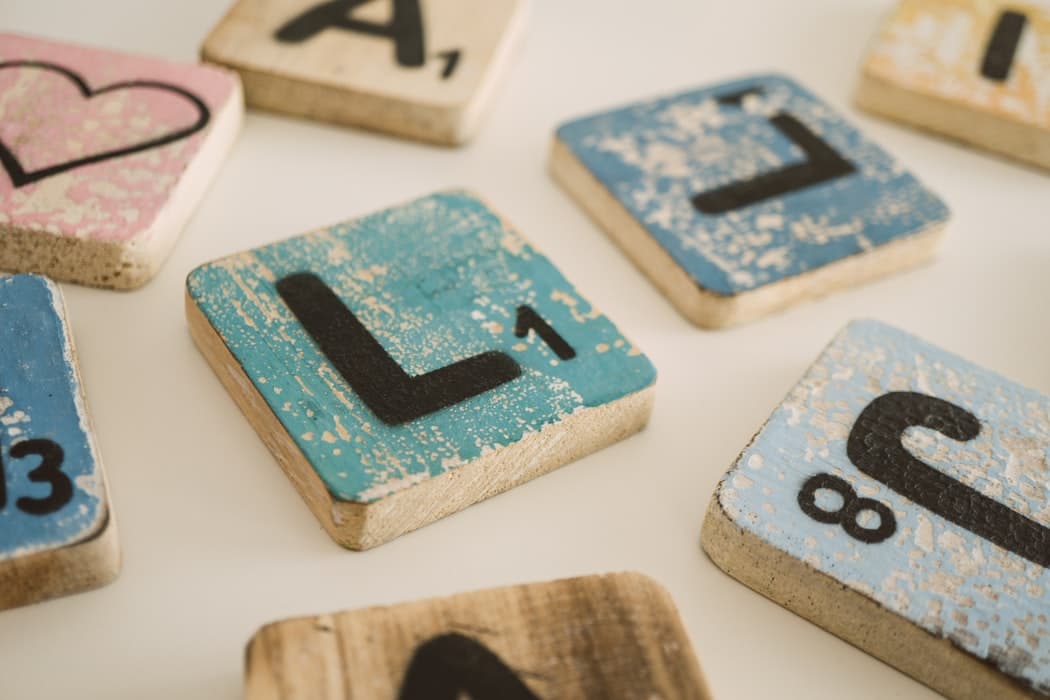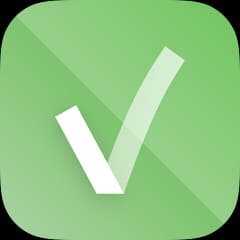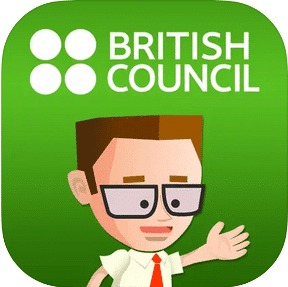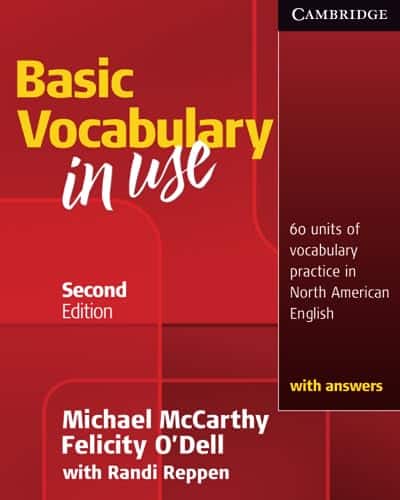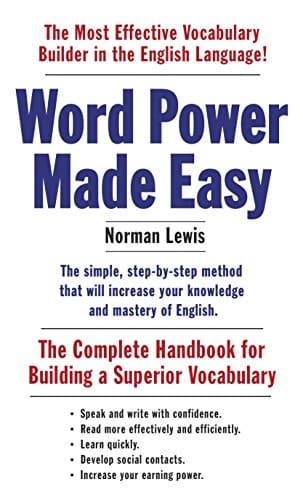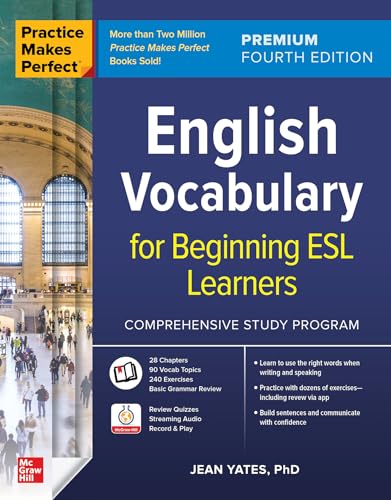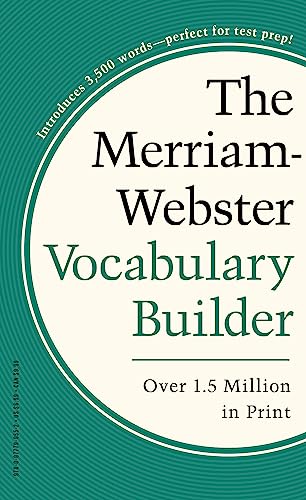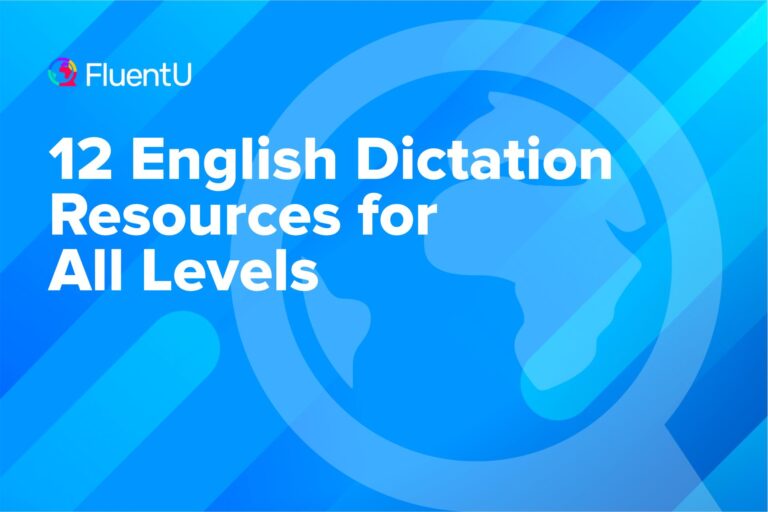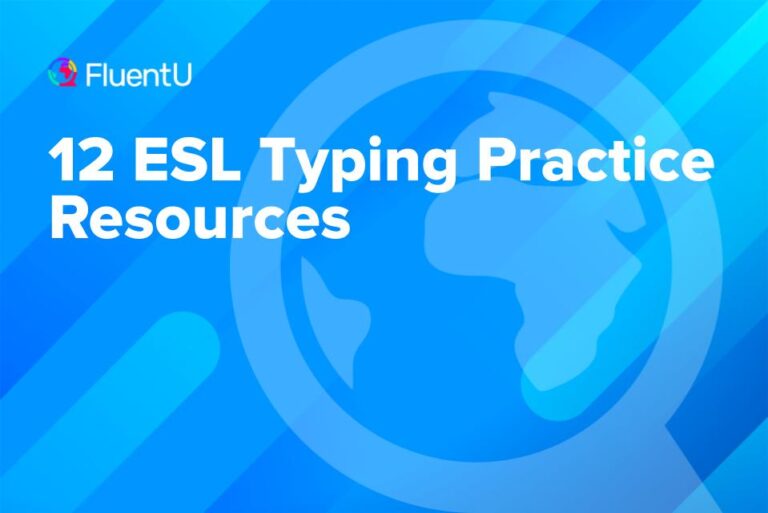Vocabulary Building Exercises for Adults (31 Resources Plus Tips)
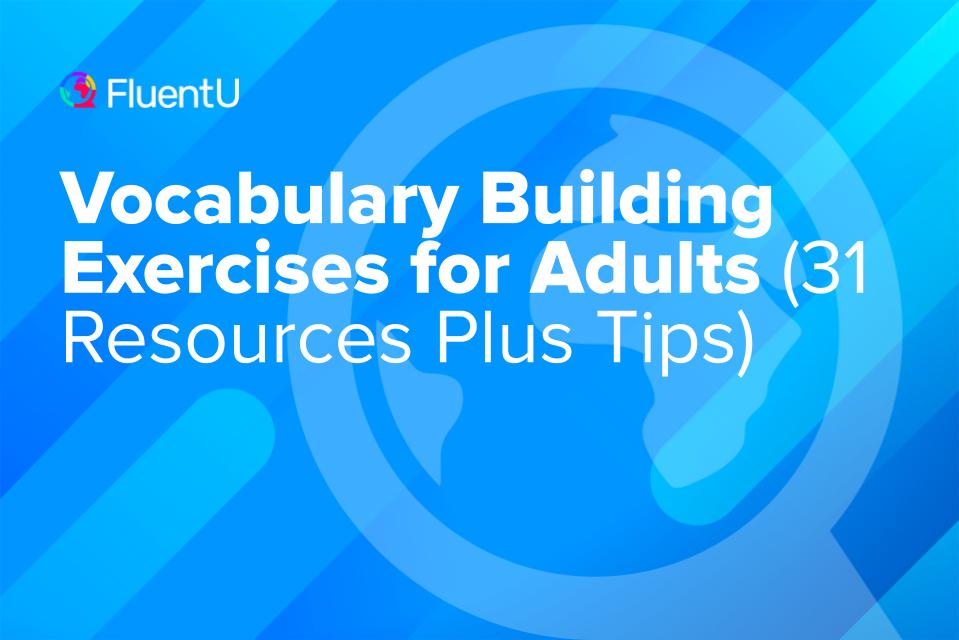
One BBC article says that if you know the 800 to 1,000 most common English words you can understand 75% of everyday conversations. To become fluent you’ll need to know at least 10,000 words, but as a language teacher, I can honestly say that the more words you know, the better. Otherwise, you’ll have a hard time communicating with native English speakers.
You can point at objects or make signs/symbols with your hands instead, but those can only get you so far. Let’s get into the vocabulary building exercises to help you practice your English and tips on how to get the most out of them.
Download: This blog post is available as a convenient and portable PDF that you can take anywhere. Click here to get a copy. (Download)
Traditional English Vocabulary Exercises
When you say that something is traditional , you mean that it’s the way something has been done for a relatively long time. So, I call the vocabulary building exercises below “traditional,” because schools have always used them to help students remember what they’ve learned in one form or another.
Below, I’ve included some of these traditional exercises and what level they’re appropriate for.
1. Multiple-choice
Level: Beginner, Intermediate, Advanced
As you can guess from the name, this is a type of exercise where you have to choose the right answer from several options. A typical multiple-choice exercise would look like this:
Choose the word that means the same as “big.”
a. small
b. tiny
c. large
d. miniscule
The correct answer is c, since all of the other answers mean the same thing as small , which is the opposite of big .
2. Matching Exercises

Level: Beginner
Matching exercises are very popular with children. These exercises ask the learner to match a word with its picture, English definition or translation into their native language.
For example, does the picture above show a pair of hands, legs or feet? (The answer is hands. )
3. Odd One Out

Level: Beginner
This type of exercise gives you several words. You then have to guess which one doesn’t belong with the others. For example:
Which of these words does not belong with the rest?
a. red
b. apple
c. green
d. yellow
The correct answer is “b,” because apple is a fruit, while everything else is a type of color.
4. Word Rearrangement

Level: Beginner
In this type of exercise, you’ll be given some words that you have to rearrange to form a correct sentence. For example:
Fish animal an is water lives a in that. (The correct answer is “A fish is an animal that lives in water.” )
5. Word Category Tables

Level: Intermediate, Advanced
These are a type of word building exercise, where you’re given the base form of a word, and you have to create new words based on it.
For example, how would you fill out this table if you’re given the noun “care?”
| Verb Form of "Care" | Adjective / Adjectives | Adverb / Adverbs |
|---|---|---|
Here’s how I would answer it:
| Verb Form of "Care" | Adjective / Adjectives | Adverb / Adverbs |
|---|---|---|
| to care | careful | carefully |
| careless | carelessly |
6. Word Families
Level: Intermediate, Advanced
In this exercise, you’re going to be given a word, and you have to write as many words related to it as you can.
For example, if the word is bake (to cook food in an oven), you can write baking (gerund form of “bake”) , baked (past tense of “bake”), baker (a person who bakes), bakery (a place that sells baked goods), overbake (bake too much), underbake (bake too little), prebake (bake beforehand) and so on.
7. Find the Synonym

Level: Beginner, Intermediate, Advanced
Remember the very first exercise I introduced, which involved choosing the word that means the same as “big?” Well, big and large are examples of synonyms or words that have the same meaning.
In the same way, small , tiny and miniscule also mean the same thing.
8. Find the Antonym

Level: Beginner, Intermediate, Advanced
An antonym , on the other hand, has the opposite meaning as the given word.
For example, how would you fill out this table?
| Word | Antonym |
|---|---|
| black | |
| long | |
| thin | |
| on | |
| fast |
The answers are:
| Word | Antonym |
|---|---|
| black | white |
| long | short |
| thin | fat |
| on | off |
| fast | slow |
9. Translate the Sentence

Level: Intermediate, Advanced
Translating sentences is very helpful because you can practice not only your newly learned words, but also your knowledge of English in general (such as grammar and sentence structure).
There are two main types of translation exercises: English to your native language and vice versa (the other way around). Because translation exercises can be anything, I’ll point you to this post on specific ways to learn English by translation.
10. Fill in the Blanks

Level: Beginner, Intermediate, Advanced
In this type of exercise, there are one or more words missing in a sentence or text, and you have to guess what those missing words are. Sometimes known as “cloze activities,” examples of them can be found here.
11. SRS (Spaced Repetition System)
Level: Beginner, Intermediate, Advanced
If you’ve never heard of a spaced repetition system (SRS) before, it’s a method where you review what you’ve studied within small blocks at a time (like 30 minutes), and gradually increase the time between those blocks.
For example, you might study your house vocabulary on Monday, then on Tuesday, then again on Thursday and again on Sunday. The objective (thing you want to do or achieve) of this method is to give your brain enough time to absorb what you’ve learned, ensuring that you remember your lessons for as long as possible.
I’ll go into a few apps that can help you incorporate (include) SRS into your vocabulary studies later. But if you’re not using apps for any reason, you can also use what I call the “double-time” technique.
Basically, it goes like this:
- Start with repeating the words 12 hours after you first learn them.
- Then, repeat them after twice that time has passed (one day or 24 hours), then double the time again (two days or 48 hours) and so on.
If you use this technique, you should be repeating the words after 12 hours, one day, two days, four days, eight days, etc. have passed since you started. The same can be done with whole exercises: Choose three to five vocabulary exercises that are challenging (difficult) for you, and do them again after 12 hours, one day, two days and so on.
You’ll be very impressed with the results!
12. Word Search Puzzles

Level: Beginner
In a word search exercise, you’ll be given a box or grid of random letters jumbled (mixed) together, and you have to find certain words according to the instructions.
For example, you may be asked to find words related to the months of the year or animal sounds. Not only are they great for testing the vocabulary you’ve just learned, but they’re also fun to do!
13. Crosswords

Level: Intermediate, Advanced
If you’re an intermediate or advanced learner, you can try doing some crosswords in English. You can find these in physical newspapers or even online.
As you can see above, crossword puzzles are made of boxes arranged either horizontally (lying down) or vertically (standing up). You have to fill out the boxes based on the clues you’ll be given. The clues have numbers that correspond to (match) groups of boxes.
What makes this game challenging is that:
- the word’s number of letters has to match the number of boxes; and
- if any letter intersects with (goes across) another group of boxes, the intersecting letter has to be the same between the two words
14. Word Games
Level: Beginner, Intermediate, Advanced
There are many types of word games available. Some come in the form of board games (like Scrabble), others can be played in your browser (like Spellbound) and still others can be downloaded to your phone as apps (like CodyCross).
If you’re serious about practicing the vocabulary you learn, you should definitely give word games a try, no matter your level of English.
Apps and Websites
If you have a smartphone and internet connection, you can access thousands of vocabulary building exercises at your fingertips—literally! Here are a few of the best ones.
15. FluentU
Price: See pricing page here
FluentU has many features that can help you learn English vocabulary without even realizing you are actually studying.
Every video comes with subtitles that are interactive and contextual. That means all you have to do is move your mouse over or tap on any word or expression and to get its translation. This will save you a lot of time because you will not have to look words up in a dictionary.
If you need more information about any word, just click on it while you are watching a video. This will open the interactive flashcard system.
FluentU’s flashcards include information such as the different meanings of a word, grammar info, audio recorded by native speakers, sample sentences with audio to see and listen to the word in context and a list of videos where you can find the word being used by native users of English. These flashcards will be all you need if you want to learn everything about any word you hear in the videos.
16. Duolingo
Price: Free (with in-app purchases)
Duolingo is an app that’s packed with (full of) exercises to help you build your English vocabulary.
Think of all the traditional exercises we talked about earlier combined into one handy (useful) tool. It’s that powerful! Plus, it’s a gamified app, meaning it’s designed to make learning feel more like a game and less like another boring thing you need to do.
Of course, Duolingo isn’t perfect. You can read an honest review of the app here.
17. Drops

Like Duolingo, Drops is a gamified app that features a ton of exercises to help you practice your English vocabulary. The lessons feature beautiful images for each word or phrase, making them easier to remember. And if you’re interested in the differences between American and British English, Drops features both of those English dialects!
Drops allows you to learn 3,000 words and phrases, which is enough to help you become conversational, but may leave you wanting more if you want to become fluent. For more information on the advantages and disadvantages of Drops, read this.
18. Busuu

Go to the “My Vocabulary” section of your Busuu app, and you’ll find the “trainer” feature. This feature allows you to test how well you remember the words you learned through the app.
You can choose to take a quiz on all of the vocabulary words you’ve studied so far, or just the ones that you feel you’re having a little more trouble with. If you choose the latter option, your best bet is the “Strengthen Vocabulary” feature, which will test the words you previously got wrong.
Before you download this app, make sure to read this Busuu review first.
19. WordUp
Price: Free (with in-app purchases)
WordUp is one of the newer English vocabulary apps as of this writing. It can get you closer to native fluency than most apps, as it features 25,000 of the most “useful” English words. These are ranked according to how often they appear in real-world media like movies and TV shows.
WordUp uses artificial intelligence (AI) to help you identify the words you already know and the words you still need to work on. Visual learners in particular will benefit from this app, because it creates “knowledge maps” where you can see your progress at a glance (with one look).
20. 4 Pics 1 Word
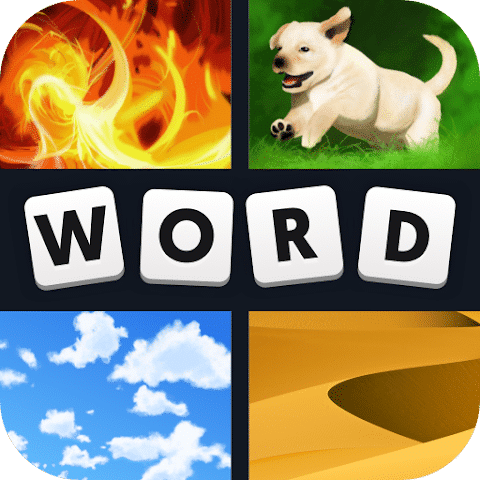
Price: Free (with in-app purchases)
If you’re ready to take it up a notch (level up or make something more difficult) without losing the fun factor, there are few better games out there than 4 Pics 1 Word.
As its name suggests, you’ll be given four pictures, and you have to guess the one word that all those pictures have in common. For example, if you see four pictures of crying people, then the answer is “cry.” Of course, not all of the questions are as easy as that, so depending on your level, this could make the game either more interesting or more intimidating (scary).
21. Anki

Anki is probably the most popular flashcard app for learning languages. That’s because their flashcards are highly customizable , meaning you can create them to fit your learning style, study needs, etc.
You can tag words based on how easy (or how difficult) they are to remember. And if you don’t want to go through all the trouble of making flashcards on your own, you can always download entire decks made by other users!
For more information on how to use Anki for learning languages, go here.
22. Quizlet
Price: Free (with in-app purchases)
Like Anki, Quizlet is a flashcard app. If you type “english vocabulary” into the search bar, you’ll come up with over 600 pages of flashcard sets related to English vocabulary. Note that some of them are from English to other languages, however, so make sure you’re only using the ones labeled “English-English.”
Quizlet flashcards can be filtered according to the number of terms, the type of user who made them (random user or a teacher) and whether they contain additional features like images and diagrams. If you have an account, you can take advantage of the “Test” feature on each flashcard set to find out how many of the terms you can recall.
23. Vocabulary.com
Price: Free
Vocabulary.com offers plenty of options for helping you learn vocabulary. You can go the traditional route and use their built-in dictionary and vocabulary lists. Or you can play their vocabulary games to your heart’s content (as much as you’d like)!
I especially like their English VocabTrainer. Using that, you can answer questions in a variety of formats—choosing the picture that best fits the word, choosing the best word to complete a sentence, choosing the synonym or antonym of a word and so on. This is one of the most comprehensive resources for English vocabulary exercises, in my opinion.
24. Johnny Grammar Word Challenge
Price: Free
This app from the British Council features 10 English vocabulary topics, including food, travel and small talk. If you want to practice vocabulary in particular, choose the “Words” quiz category, and pick one of three difficulty levels: Easy, Medium and Hard.
The nice thing about this app is that, if you get any answers wrong, you’re going to get detailed feedback. That way, you’ll know not to make the same mistake next time!
25. SpeakSpeak English Grammar & Vocabulary Exercises
Price: Free
Available on: Website
SpeakSpeak sorts English vocabulary exercises according to difficulty level. Those marked A1/A2 are for beginners, those labeled B1/B2 are for intermediate learners and the C1/C2 exercises are for advanced students.
You can choose vocabulary exercises on specific topics like animal body parts, phrasal verbs and plural nouns. Not sure which topic to choose? No problem—just take the general knowledge quizzes for your level.
26. EnglishClub Vocabulary Quizzes
Price: Free
Available on: Website
Similar to SpeakSpeak, the vocabulary exercises on this website are sorted according to topic and difficulty level. They have some fun topics like movies, music and sports. And if you want to try out your mastery of adjectives, idioms and confusing words, the site covers those, too.
To take the quizzes appropriate to your level, scroll down until you find the section called “Graded Vocabulary Quizzes.”
27. LearnEnglishFeelGood Vocabulary Training
Price: Free
Available on: Website
Unlike some of the other websites and apps listed so far, this one doesn’t sort quizzes according to difficulty level. Instead, they’re sorted according to topic.
For visual learners or those who like their quizzes with pictures, there are the “Visual Vocabulary Tests.” Those who want to brush up on their knowledge of holidays in the English-speaking world can scroll down to “Holidays.” And again, if you’re not sure what topic you want to work on right now, you can try any of the exercises under “Other Vocabulary Topics.”
Books
There are also many books specifically designed to teach you vocabulary. This is arguably the most traditional way of getting your vocabulary practice. But I assure you that once you try it, you’ll fall in love with it!
28. “Basic Vocabulary in Use”
“Basic Vocabulary in Use” is the first in a three-book series (group of things related to each other) called “English Vocabulary in Use.” Each book will teach you about 1,000 words appropriate for your level.
The format of the book is pretty intuitive (easy to understand without prior knowledge). You have the vocabulary words you’re studying on the left and the exercises on the right. That means you can easily check your answers after you’re done with the exercises—as long as you remember to cover the left side of the book while doing the quizzes.
29. “Word Power Made Easy”
I know English vocabulary books can get dry and boring at times. Luckily, “Word Power Made Easy” isn’t one of them.
The words are defined in a way that’s accessible (easy to understand) for most people. The author also writes humorously (in a funny way), so you’ll chuckle (laugh softly) as you go through this book.
Most importantly, the book is packed with quizzes and other review materials, ensuring that you’ll never forget anything you’ve learned from it.
30. “Practice Makes Perfect: English Vocabulary for Beginning ESL Learners”
You can think of this one as the physical equivalent of the vocabulary exercise websites I just mentioned earlier. The words are grouped into topics and accompanied by (come with) over 200 exercises.
Best of all, the exercise answers have audio that you can access using the free McGraw-Hill Language Lab app (available on iOS and Android). This allows you to strengthen and practice your pronunciation of the new words you learn.
31. “Merriam-Webster’s Vocabulary Builder”
If you’ve ever searched for the meaning of any English word online, chances are you’ve come across a definition from the Merriam-Webster dictionary. That’s because the company is reputable (well-respected), having had a long history of publishing dictionaries all the way back from 1847!
The cool thing about this one is that, aside from definitions, it also teaches you the Latin and Greek roots of words. This helps you identify their meaning and easily spot similar words in the future.
Of course, the book wouldn’t be featured on this list if it doesn’t have exercises. In fact, it has those in spades (to have a large amount of something). And if you’re preparing for standardized English proficiency exams like the TOEFL and TOEIC, this is a handy resource to have with you.
How Exercises Can Help You Improve Your English Vocabulary
- They help you remember words and expressions more easily. If you’re only reading a list of words and their translations over and over again, you’ll get bored very fast and learn only a few words (if you learn anything at all). But if you try to learn the same list of words with the help of exercises, you’ll have more fun and learn many more new words. When you learn new words in context, you’re more likely to enjoy what you’re doing and have a greater chance of reaching your goal of increasing your English vocabulary.
- They help you improve all four of the main language skills: listening, writing, reading and speaking. Many exercises concentrate on the written form, but others (especially those from apps or websites) have other features. Some of them have audio, others have reading comprehension exercises and still others encourage you to say the new words you learned out loud using speech recognition.
- They help you break the infamous (famous for being terrible) “Intermediate Plateau.” Also known as the “language learning plateau,” this is where you feel like you’re not learning fast enough or at all. Since this is often caused by the lack of vocabulary, it makes sense that exercises that build your English vocabulary can help you break the plateau and go to the next level.
Tips for Learning with English Vocabulary Exercises
- Keep a notebook. I’m a huge fan of writing new words in a notebook and creating sentences with them. This is a superb (great) exercise that will help you practice vocabulary and grammar at the same time. Plus, since you’re writing, you’ll be practicing one of the four major language skills and better remember what you’ve learned.
- Choose the right level for you. If you’re a beginner, you’ll get discouraged if you try to do exercises meant for advanced learners. Likewise, if you’re an advanced learner, you’ll get bored with exercises that are too easy for your level. Ideally, you should take exercises that are one level above yours, but no higher than that. This will challenge you enough to grow, but not scare you enough that you’ll give up altogether.
- Use the newly learned words in context. No matter how many words you memorize, you’ll eventually forget them if you don’t use them. So take advantage of these exercises to use your newly acquired (gotten) vocabulary as much as possible.
- Create your own vocabulary exercises. If none of the available exercises quite fit your needs, you can always make your own! All you need are a list of words you want to study, your imagination and a type of exercise. The exercise might be your own invention, or you could take inspiration from the existing ones above. Don’t be afraid to experiment and find out what works for you!
- Mix things up. To mix things up means to change or add something to what you’re currently doing. Instead of doing the same types of exercises, you can do things like learn English vocabulary from memes, choose five words for the day and use them to greet your friends and family, or do all of these other things to help you learn English vocabulary.
Now, you’re ready to use English vocabulary exercises in a way that will allow you to get the most out of them.
As you can see, the options are practically endless. You just have to choose the methods and techniques that work best for you.
Remember that learning English vocabulary can be fun and enjoyable if you do it correctly.
Use the tips included in this post, and you’ll feel the difference.
Happy English vocabulary learning!


